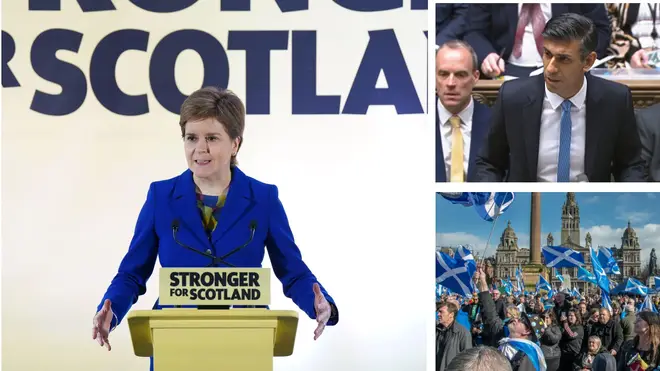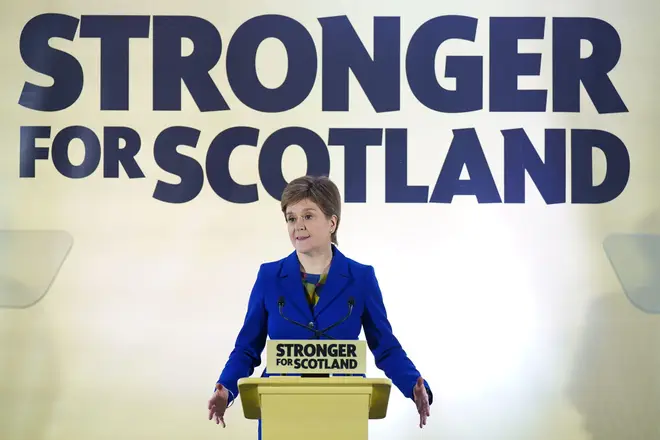
Paul Brand 3pm - 6pm
23 November 2022, 10:01 | Updated: 23 November 2022, 15:04

Nicola Sturgeon was urged to drop her independence "obsession" after suffering a massive setback in her battle to split the UK.
The Scottish First Minister said "Scottish democracy will not be denied" after the Supreme Court ruled Holyrood does not have the power to legislate for a second independence referendum without the permission of the UK Government.
The SNP leader said she was "disappointed" by the decision but that she does "respect" it, adding that the Supreme Court "doesn't make law" it "only interprets it".
She said the ruling had blocked "one route to Scotland's voice being heard" and "in a democracy our voice cannot and will not be silenced".
Later in the Commons, Mr Sunak said the ruling had been "clear and definitive".
He said: "The people of Scotland want us to be working on fixing the major challenges we collectively face, whether that's the economy, supporting the NHS or indeed supporting Ukraine.
"Now is the time for politicians to work together and that's what this Government will do."

Earlier the Supreme Court in London ruled the Scottish Parliament cannot hold a second independence referendum without the UK government’s consent.
The court unanimously ruled that the Scottish Government does not have the legal power to call a second vote.
The court's president Lord Reed said: "The Scottish Parliament does not have the power to legislate for a referendum on independence.”
"The Scotland Act gives the Scottish Parliament limited powers," he added.
The Scottish government had hoped to hold Indyref2 on October 19 next year.
Announcing the Supreme Court's unanimous decision, Lord Reed said that legislation for a second independence referendum would relate to "reserved matters" and was therefore outside the powers of Holyrood.
He said: "A lawfully-held referendum would have important political consequences relation to the Union and the United Kingdom Parliament.
"Its outcome would possess the authority, in a constitution and political culture founded upon democracy, of a democratic expression of the view of the Scottish electorate.
"It would either strengthen or weaken the democratic legitimacy of the Union and of the United Kingdom Parliament's sovereignty over Scotland, depending on which view prevailed, and would either support or undermine the democratic credentials of the independence movement.
"It is therefore clear that the proposed bill has more than a loose or consequential connection with the reserved matters of the Union of Scotland and England, and the sovereignty of the United Kingdom Parliament."
1/ While disappointed by it I respect ruling of @UKSupremeCourt - it doesn't make law, only interprets it.
— Nicola Sturgeon (@NicolaSturgeon) November 23, 2022
A law that doesn't allow Scotland to choose our own future without Westminster consent exposes as myth any notion of the UK as a voluntary partnership & makes case for Indy
Nicola Sturgeon tweeted: “While disappointed by it I respect the ruling of the UK Supreme Court.
“It doesn't make law, only interprets it.
“A law that doesn't allow Scotland to choose our own future without Westminster consent exposes as myth any notion of the UK as a voluntary partnership & makes case for Indy.
“Scottish democracy will not be denied.
“Today’s ruling blocks one route to Scotland’s voice being heard on independence - but in a democracy our voice cannot and will not be silenced.”
Shadow Scottish secretary Ian Murray said the court's decision should be respected - and insisted Labour could offer the change needed by the people of Scotland.
"The UK Supreme Court has made their decision and we should respect that and thank them for their work," he said.
"The people of Scotland do want and need change regardless of their views on the constitution.
"Change is coming with a UK Labour government at the next election."
In response to the Supreme Court ruling, SNP MP Hannah Bardell said: "The question remains of how this can, in any way, be a voluntary union.
"It's clearly not."